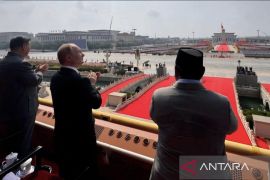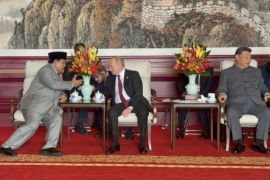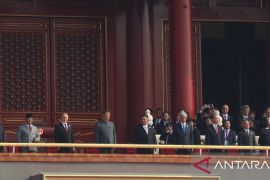"Chinese leaders have agreed to my proposal for renegotiation of the Tangguh LNG sale price so that Indonesia would obtain a bigger share," President Yudhoyono said.Jakarta (ANTARA News) - President Susilo Bambang Yudhoyono said China had agreed to renegotiate the sale price of Tangguh liquefied natural gas (LNG) so that Indonesia was expected to sell it a better price.
"Chinese leaders have agreed to my proposal for renegotiation of the Tangguh LNG sale price so that Indonesia would obtain a bigger share," President Yudhoyono said on Twitter here on Wednesday.
The President said that the readiness of the Chinese leaders to renegotiate the liquefied natural gas sale contract was one of the main items of a report by Rudy Ribiandini, the head of the Upstream Oil and Gas Regulatory Task Force (SKK Migas) to the head of state here on Tuesday.
"Today (Tuesday, May 7), the head of the Upstream Oil and Gas Regulatory Task Force reported to me about his tasks, among others, the efforts to increase oil and gas production as well as renegotiation of the Tangguh LNG sale price," the President said.
In the meeting with the SKK Migas head, the President also stressed that the SKK Migas should reject any intervention from any party which was disadvantageous to the state.
"On the oil and gas business, I instruct (oil officials) to do business correctly. Intervention should be rejected, no matter where it comes from," the head of state said.
According to the Jakarta Globe in August last year, the Indonesian government expected revenue from oil and gas to increase if the renegotiated gas contract at Tangguh LNG plant concludes in June 2013.
Raden Priyono, the chairman of oil and gas regulator BP Migas, said the government was trying to adjust the selling price of Tangguh LNG in accordance with the market price and was waiting for a compensation demand from the Chinese government.
"There will be compensation in the renegotiation. Fujian asks for something and we are waiting for it. The renegotiation will be concluded by mid-next year," Raden said.
Exports to Fujian accounted for 11 percent of the total production of 7.6 million tons per year from the Tangguh field, which is operated by British resource giant BP.
It also has contracts to export gas to Japan, Korea and Taiwan, with shares of 41 percent, 38 percent and 9 percent, respectively. The selling price of Tangguh gas has been scrutinized as it is well below market price.
The current price for Tangguh LNG is $3.35 per million British thermal unit (mmbtu).
The contract, signed in 2006, is a revision from the original 2002 contract with a selling price of $2.40 per mmbtu.
The low-selling price to Fujian could be traced back to 2000, when the Indonesian government lost out to the Australian government in a bidding war for the LNG contract in Guangdong, China. Back then the Australian government offered a more attractive incentive package.
Rudi Rubiandini noted that revenue from sales of Tangguh LNG to Fujian was only US$931 million a year due to the price agreed in the contract.
By comparison, Tangguh LNG exports to Taiwan, which accounted for 9 percent, generated US$1.8 billion in revenue.
Rudi said the price formula at the time of the contract was tied with the price of the Japan Crude Cocktail at around $38 per barrel.
"Fortunately, the contract allows for the price to be revised every four years. And for that reason, the renegotiation must be carried out to boost state revenue," he said.(*)
Editor: Heru Purwanto
Copyright © ANTARA 2013











